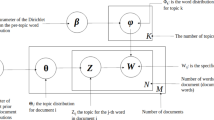Abstract
OERs have high-potential to satisfy learners in many different circumstances, as they are available in a wide range of contexts. However, the low-quality of OER metadata, in general, is one of the main reasons behind the lack of personalised, OER based services such as search and recommendation. As a result, the applicability of OERs remains limited. Nevertheless, OER metadata about covered topics (subjects) is essentially required by learners to build effective learning pathways towards their individual learning objectives. Therefore, in this paper, we report on a work in progress project proposing an OER topic extraction approach, applying text mining techniques, to generate high-quality OER metadata about topic distribution. This is done by: 1) collecting 27 lectures from Coursera and Khan Academy in the area of an important skill in the area of Data Science (i.e. Text Mining as our first focus), 2) applying Latent Dirichlet Allocation (LDA) on the collected resources in order to extract existing topics related to the skill, and 3) defining topic distributions covered by a particular OER. To evaluate our model, we used the data-set of educational resources from Youtube, and compared our topic distribution results with their manually defined target topics with the help of 3 experts in the area of data science. As a result, our model extracted topics with 76% of F1-score.
Access this chapter
Tax calculation will be finalised at checkout
Purchases are for personal use only
Similar content being viewed by others
References
Blei, D.M., Ng, A.Y., Jordan, M.I.: Latent Dirichlet allocation. J. Mach. Learn. Res. 3, 993–1022 (2003)
de Carvalho Saraiva, M., Medeiros, C.B.: Finding out topics in educational materials using their components. In: 2017 IEEE Frontiers in Education Conference (FIE), pp. 1–7. IEEE (2017)
Fabbri, A.R., et al.: TutorialBank: a manually-collected corpus for prerequisite chains, survey extraction and resource recommendation. arXiv preprint arXiv:1805.04617 (2018)
García-Floriano, A., Ferreira-Santiago, A., Yáñez-Márquez, C., Camacho-Nieto, O., Aldape-Pérez, M., Villuendas-Rey, Y.: Social web content enhancement in a distance learning environment: intelligent metadata generation for resources. Int. Rev. Res. Open Distrib. Learn. 18(1), 161–176 (2017)
Jelodar, H., et al.: Latent Dirichlet allocation (LDA) and topic modeling: models, applications, a survey. Multimedia Tools Appl. 78(11), 15169–15211 (2018). https://doi.org/10.1007/s11042-018-6894-4
Röder, M., Both, A., Hinneburg, A.: Exploring the space of topic coherence measures. In: Proceedings of the Eighth ACM International Conference on Web Search and Data Mining, pp. 399–408 (2015)
Saraiva, M.d.C., et al.: Relationships among educational materials through the extraction of implicit topics: Relacionamentos entre materiais didáticos através da extração de tópicos implícitos (2019)
Tavakoli, M., Elias, M., Kismihók, G., Auer, S.: Quality prediction of open educational resources a metadata-based approach. arXiv preprint arXiv:2005.10542 (2020)
Tavakoli, M., Hakimov, S., Ewerth, R., Kismihók, G.: A recommender system for open educational videos based on skill requirements. arXiv preprint arXiv:2005.10595 (2020)
Tavakoli, M., Mol, S.T., Kismihók, G.: Labour market information driven, personalized, OER recommendation system for lifelong learners. arXiv preprint arXiv:2005.07465 (2020)
Wang, J., Xiang, J., Uchino, K.: Topic-specific recommendation for open education resources. In: Li, F.W.B., Klamma, R., Laanpere, M., Zhang, J., Manjón, B.F., Lau, R.W.H. (eds.) ICWL 2015. LNCS, vol. 9412, pp. 71–81. Springer, Cham (2015). https://doi.org/10.1007/978-3-319-25515-6_7
Xie, M., Wu, C., Zhang, Y.: A new intelligent topic extraction model on web. JCP 6(3), 466–473 (2011)
Author information
Authors and Affiliations
Corresponding author
Editor information
Editors and Affiliations
Rights and permissions
Copyright information
© 2020 Springer Nature Switzerland AG
About this paper
Cite this paper
Molavi, M., Tavakoli, M., Kismihók, G. (2020). Extracting Topics from Open Educational Resources. In: Alario-Hoyos, C., Rodríguez-Triana, M.J., Scheffel, M., Arnedillo-Sánchez, I., Dennerlein, S.M. (eds) Addressing Global Challenges and Quality Education. EC-TEL 2020. Lecture Notes in Computer Science(), vol 12315. Springer, Cham. https://doi.org/10.1007/978-3-030-57717-9_44
Download citation
DOI: https://doi.org/10.1007/978-3-030-57717-9_44
Published:
Publisher Name: Springer, Cham
Print ISBN: 978-3-030-57716-2
Online ISBN: 978-3-030-57717-9
eBook Packages: Computer ScienceComputer Science (R0)




